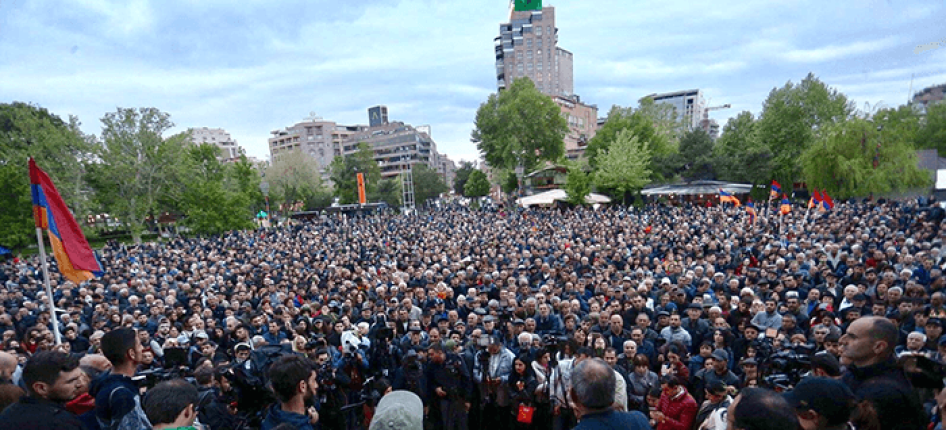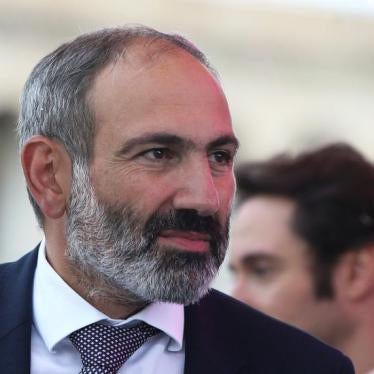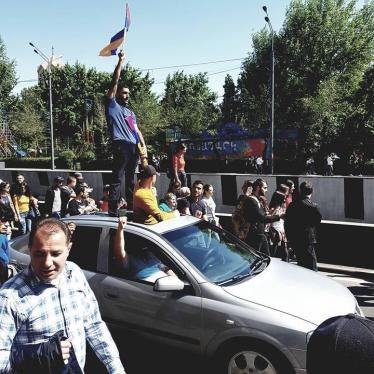As a new government sets the agenda in Yerevan, it is high time to consider the excessive use of pre-trial detention in politically sensitive trials.
The Armenians who took to the streets in the country’s largest mass protests in its post-Soviet history last month had many other grievances in addition to Serzh Sargsyan’s attempt to hold onto power. The protesters were concerned about unfair elections, corruption, and the chokehold that oligarchs have on Armenia’s economy. But they were also concerned about a justice system that many see as unfair. Some high-profile incidents have sparked perceptions of politically motivated prosecutions in the country. The new prime minister, Nikol Pashinyan, faces a major challenge in bringing about the changes the public demanded, including in the area of politicised justice.
Public perceptions that Armenia’s justice system is flawed are pervasive. In the 2017 annual nationwide survey by the Caucasus Research Resource Center, a non-profit independent research organisation, only four percent of respondents fully trusted the courts and 30% fully distrusted them.
A few examples of politically sensitive cases — especially those linked to public protests or other civic and political activism —illustrate why these perceptions hold.
One-sided accountability
Anti-government protests are not unusual in contemporary Armenia. Most have been peaceful, though they no doubt posed serious challenges for the police. In rare cases, protesters have clashed violently with police. The police often break up protests—peaceful and not--using excessive force, in some cases causing serious injuries. Yet the authorities have gone after only one set of offenders, hauling in protesters and prosecuting them, but allowing police who used excessive force to evade punishment. In one example, protests in March 2008 started out peaceful but ended up in deadly clashes after police used excessive force against protesters who posed no threat to them. Fifty-two protesters were sentenced to prison. But even though three out of the ten people who died had been hit by teargas canisters (likely fired directly at the demonstrators from close range by the police), no police were prosecuted.
A more recent example is the July 2016 protests, sparked by the violent seizure of a Yerevan police station by Sasna Tsrer, aradical opposition group. Public support for them and disaffection with the government grew into almost daily protests in Yerevan. On July 29, police used excessive force to break up the main protest, which was largely peaceful, causing injuries, some serious. This time an investigation did lead to the sacking of the Yerevan police chief and disciplinary measures against 17 officers.
But the authorities also aggressively prosecuted 21 protesters, with 11 sentenced to prison terms of up to three-and-a-half years for participating in mass disorders and interfering with the work of a journalist. Such uneven efforts at accountability fuel perceptions of political manipulation of the justice system.
Abuse of pre-trial detention
Although not alone in the region to do so, Armenian courts overwhelmingly use extensive pretrial detention, which we have documented in politically sensitive cases. Prosecutors often simply list the reasons established in Armenian law for denying bail, including flight risk and possible hindrance of the investigation, without showing that the grounds are justifiably applicable to the suspect. Then the courts simply approve pretrial detention, in violation of European Court case law, which has repeatedly clarified that the courts should not rely on “general and abstract” reasons for detention.
Just one example was the use of pretrial detention against the opposition and protest leader Andreas Ghukasyan, who was arrested for the July 2016 protest. The authorities kept Ghukasyan locked up for nearly two years during the investigation, citing only the gravity of the charges as justification. Ghukasyan was released on 7 May, after Sargsyan resigned. And though Ghukasyan still faces serious criminal charges, now he is at liberty and is not being preemptively punished for charges that still have to be proven. And he will be able to mount his defense without the additional pressure of being in jail.
Another example is Garo Yegnukyan, a member of the political group Founding Parliament, who has been behind bars since his arrest in July 2016. The authorities charged him with aiding Sasna Tsrer in taking over the police station, based, apparently, only on several wiretapped phone conversations. The prosecution has stated that Yegnukyan is a flight risk and could interfere with the investigation, but has offered no specific facts or circumstances to substantiate those claims, which should be necessary to maintain Yegnukian’s pretrial detention.
At least 10 other people arrested during the same protest remain in pretrial detention, all of them charged with violence against policemen.
Disproportionate charges and sentences
The authorities have also used disproportionate charges and sentences against opposition and political activists. For example, in January 2017 an opposition activist, Gevorg Safaryan, was sentenced to two years in prison for an incident that took place a year before, when a group of anti-government demonstrators tried to hold a small, peaceful public gathering on New Years’ Eve in Yerevan’s Freedom Square. Police interfered roughly after participants tried to place a small New Year’s tree in the square, and a scuffle ensued between police and a few protesters, including Safaryan. Police released the others, but Safaryan, who had been frequently involved in protests, was charged and sentenced to two years in prison for using violence against police.
Just before Safaryan’s prison term was to end in December 2017, which included his time in pretrial detention, the authorities filed new charges against him, this time, for conspiracy — together with Founding Parliament’s leader, Jirair Sefiliyan — to create mass disturbances in April 2015.
I reviewed the indictment and verdict. The charges seemed to be based mostly on speeches that contained radical, but not unlawful, speech.
Both were convicted in March. Safaryan was sentenced to four years. Sefiliyan, who was charged with several additional crimes, along with five others in the same conspiracy case, got 11 years.
In some instances, the authorities have brought charges against activists seemingly in retaliation for their activism. Armenian rights groups have raised concerns about spurious criminal embezzlement charges against Marina Poghosyan, whose Veles organisation provides legal support to victims of predatory lenders, including some with alleged links to local authorities. She could face up to eight years in prison if convicted.
What’s next?
Prime Minister Pashinyan recently said that cases of politically motivated prosecutions needed to be resolved, “resorting to legitimate tools only,” presumably meaning through the courts and the rest of the criminal justice system.
One step prosecutors and judges can take right away is to stop the blanket use of pretrial custody, and instead use it only as a measure of last resort when the facts justify it, in accordance with Armenia’s international obligations. They will also need to sift very carefully through numerous cases pending in the first instance or appeal courts, to ensure that charges and appealed convictions are based on sound evidence and are not excessive, intended to silence others, or to settle scores with people whose messages the authorities don’t agree with.
Resolving the issue of politically motivated prosecutions will be challenging, but very important to restore faith in Armenia’s criminal justice.









